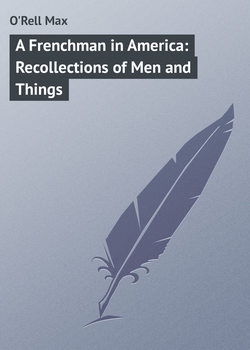Читать книгу A Frenchman in America: Recollections of Men and Things - O'Rell Max - Страница 2
CHAPTER II
ОглавлениеArrival of the Pilot – First Look at American Newspapers
Saturday, January 4, 1890.
We shall arrive in New York Harbor to-night, but too late to go on shore. After sunset, the Custom House officers are not to be disturbed. We are about to land in a country where, as I remember, everything is in subjection to the paid servant. In the United States, he who is paid wages commands.
We make the best of it. After having mercilessly tumbled us about for nine days, the wind has graciously calmed down, and our last day is going to be a good one, thanks be. There is a pure atmosphere. A clear line at the horizon divides space into two immensities, two sheets of blue sharply defined.
Faces are smoothing out a bit. People talk, are becoming, in fact, quite communicative. One seems to say to another: “Why, after all, you don’t look half as disagreeable as I thought. If I had only known that, we might have seen more of each other, and killed time more quickly.”
The pilot boat is in sight. It comes toward us, and sends off in a rowing-boat the pilot who will take us into port. The arrival of the pilot on board is not an incident. It is an event. Does he not bring the New York newspapers? And when you have been ten days at sea, cut off from the world, to read the papers of the day before is to come back to life again, and once more take up your place in this little planet that has been going on its jog-trot way during your temporary suppression.
The first article which meets my eyes, as I open the New York World, is headed “High time for Mr. Nash to put a stop to it!” This is the paragraph:
Ten days ago, Mrs. Nash brought a boy into existence. Three days afterward she presented her husband with a little girl. Yesterday the lady was safely delivered of a third baby.
“Mrs. Nash takes her time over it” would have been another good heading.
Here we are in America. Old World ways don’t obtain here. In Europe, Mrs. Nash would have ushered the little trio into this life in one day; but in Europe we are out of date, rococo, and if one came over to find the Americans doing things just as they are done on the other side, one might as well stay at home.
I run through the papers.
America, I see, is split into two camps. Two young ladies, Miss Nelly Bly and Miss Elizabeth Bisland, have left New York by opposite routes to go around the world, the former sent by the New York World, the latter by the Cosmopolitan. Which will be back first? is what all America is conjecturing upon. Bets have been made, and the betting is even. I do not know Miss Bly, but last time I came over I had the pleasure of making Miss Bisland’s acquaintance. Naturally, as soon as I get on shore, I shall bet on Miss Bisland. You would do the same yourself, would you not?
I pass the day reading the papers. All the bits of news, insignificant or not, given in the shape of crisp, lively stories, help pass the time. They contain little information, but much amusement. The American newspaper always reminds me of a shop window with all the goods ticketed in a marvelous style, so as to attract and tickle the eye. You cannot pass over anything. The leading article is scarcely known across the “wet spot”; the paper is a collection of bits of gossip, hearsay, news, scandal, the whole served à la sauce piquante.
Nine o’clock.
We are passing the bar, and going to anchor. New York is sparkling with lights, and the Brooklyn Bridge is a thing of beauty. I will enjoy the scene for an hour, and then turn in.
We land to-morrow morning at seven.
